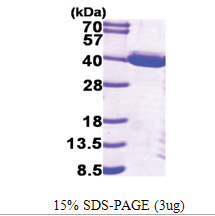TP53I3 (1-332, His-tag) Human Protein
Other products for "TP53I3"
Specifications
| Product Data | |
| Species | Human |
| Expression Host | E. coli |
| Expression cDNA Clone or AA Sequence |
MGSSHHHHHH SSGLVPRGSH MLAVHFDKPG GPENLYVKEV AKPSPGEGEV LLKVAASALN RADLMQRQGQ YDPPPGASNI LGLEASGHVA ELGPGCQGHW KIGDTAMALL PGGGQAQYVT VPEGLLMPIP EGLTLTQAAA IPEAWLTAFQ LLHLVGNVQA GDYVLIHAGL SGVGTAAIQL TRMAGAIPLV TAGSQKKLQM AEKLGAAAGF NYKKEDFSEA TLKFTKGAGV NLILDCIGGS YWEKNVNCLA LDGRWVLYGL MGGGDINGPL FSKLLFKRGS LITSLLRSRD NKYKQMLVNA FTEQILPHFS TEGPQRLLPV LDRIYPVTEI QEAHKYMEAN KNIGKIVLEL PQ
|
| Tag | His-tag |
| Predicted MW | 37.6 kDa |
| Concentration | lot specific |
| Purity | >90% by SDS - PAGE |
| Presentation | Purified |
| Buffer | Presentation State: Purified State: Liquid purified protein Buffer System: 20 mM Tris-HCl buffer (pH 8.0) containing 10% glycerol, 0.1 M NaCl |
| Preparation | Liquid purified protein |
| Protein Description | Recombinant human TP53I3 protein, fused to His-tag at N-terminus, was expressed in E.coli and purified by using conventional chromatography techniques. |
| Storage | Store undiluted at 2-8°C for up to two weeks or (in aliquots) at -20°C or -70°C for longer. Avoid repeated freezing and thawing. |
| Stability | Shelf life: one year from despatch. |
| Reference Data | |
| RefSeq | NP_001193731 |
| Locus ID | 9540 |
| UniProt ID | Q53FA7 |
| Cytogenetics | 2p23.3 |
| Synonyms | PIG3 |
| Summary | The protein encoded by this gene is similar to oxidoreductases, which are enzymes involved in cellular responses to oxidative stresses and irradiation. This gene is induced by the tumor suppressor p53 and is thought to be involved in p53-mediated cell death. It contains a p53 consensus binding site in its promoter region and a downstream pentanucleotide microsatellite sequence. P53 has been shown to transcriptionally activate this gene by interacting with the downstream pentanucleotide microsatellite sequence. The microsatellite is polymorphic, with a varying number of pentanucleotide repeats directly correlated with the extent of transcriptional activation by p53. It has been suggested that the microsatellite polymorphism may be associated with differential susceptibility to cancer. Alternatively spliced transcript variants encoding different isoforms have been found for this gene. [provided by RefSeq, May 2011] |
| Protein Families | Druggable Genome |
| Protein Pathways | p53 signaling pathway |
Documents
| FAQs |
| SDS |
Resources
Recombinant Protein Resources |
{0} Product Review(s)
0 Product Review(s)
Submit review
Be the first one to submit a review
Product Citations
*Delivery time may vary from web posted schedule. Occasional delays may occur due to unforeseen
complexities in the preparation of your product. International customers may expect an additional 1-2 weeks
in shipping.






























































































































































































































































 Germany
Germany
 Japan
Japan
 United Kingdom
United Kingdom
 China
China
